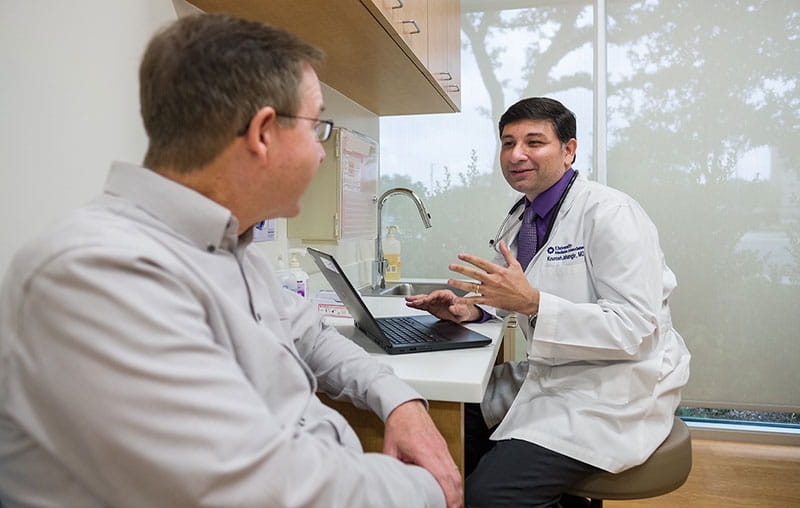Men's Health
People who are assigned male at birth are at a higher risk for certain health conditions because of their biology and anatomy.
Men can stay on top of their health by attending yearly check-ups with their primary care providers, who can screen for diseases and refer patients to specialists if needed.
Men’s Health Conditions
As men age, they are at a higher risk of developing health problems including:
- Heart attack
- Heart disease
- Mental illness
- Type 2 diabetes
- Stroke
- Erectile dysfunction
- Prostate cancer
- Sleep apnea
Risk Factors for Men's Health Conditions
While certain health conditions can affect any man, there are some factors that increase your risk for heart disease, cancer and stroke, including:
- Being overweight
- Smoking
- Family history
- High blood pressure
- High cholesterol
- Being physically inactive
Preventive Medicine
Prevention is the best medicine. Even when you feel healthy, it’s important to visit your primary care provider at least once a year. Primary care providers can screen for health conditions at routine exams and physicals. Staying up to date on immunizations is important, too.
Recommended Health Screenings for Men
- Blood pressure screening
- Cholesterol screening
- Every five years for adults from ages 20-65, and every year after age 65, according to the Centers for Disease Control and Prevention
- Colorectal cancer screening
- Ages 45-75, according to the United States Preventive Services Task Force
- Diabetes (glucose) screening
- Ages 40-70 who are overweight or obese, according to the American Academy of Family Physicians
- Infectious disease screening
- HIV screening: ages 13-64 at least once and on as-needed basis based on sexual activity, according to American Academy of Family Physicians
- No routine screening recommended, however, have conversation with provider based on sexual history, according to American Academy of Family Physicians
- Dental exam (yearly)
- Eye exam (yearly)
- Especially if you have diabetes
- Prostate cancer screening (ages 55-69)
- Generally not done until age 55 if symptomatic. Should discuss risks and benefits with your primary care provider.
- American Academy of Family Physicians does not recommend the use of PSA (prostate-specific antigen) test
Men’s Health in Bexar County and Texas
Heart disease, cancer and stroke are the top three causes of death for both men and women in Bexar County.
According to a report from the San Antonio Metropolitan Health District, men “had a 48% higher overall risk of death than females in 2019.” Researchers attribute this to the fact that men are more likely to engage in risky behaviors and are less likely to seek out medical care compared to women.
Men and boys are also more likely to have diabetes and be hospitalized due to diabetes-related conditions than women and girls, according to a 2020 report.
The Texas Cancer Registry estimates 18,950 new cases of prostate cancer in Texas in 2024. More than half of those cases are in men ages 65 and older.
University Health Resources
University Health Primary Care
Primary care providers are the best resource for health screenings and preventive medicine. University Health has primary care clinics across San Antonio.
University Health Behavioral Health
Find information about mental health care and resources on our website.
University Health NurseLink
NurseLink gives University Health patients 24/7 access to a nurse advice line. Nurses can answer your health questions and help you make appointments. Call 210-358-3000 for NurseLink.
Smoking Cessation Program
Quitting can be hard. Let our trained specialists help. Learn about University Health’s smoking cessation program.
BOOT CAMP FOR NEW DADS
A helpful, FREE, 3-hour workshop for first time dads!
Are you going to be a dad for the first time? Join our CareLink Boot Camp for New Dads! This workshop, led by experienced dads, offers interactive guidance to help you through the early stages of fatherhood. You will learn from dads who have been there before.
What you will learn:
- Keep your baby safe
- Stay calm when your baby cries
- Support your partner
- Bond with your baby
- Be part of a strong parenting team
- Handle stress at home and work
- Childproof your home
- Hold, feed, burp and change your baby
Why it’s important:
Parents need support. Babies need their dads. This workshop will give you the tools and confidence you need to be prepared for fatherhood.
Sign up today! Call 210-358-3290 or email CLOutreach@uhtx.com to register.
University Health Diabetes Classes
University Health offers free diabetes classes taught by certified diabetes educators at Texas Diabetes Institute. Learn how to manage your weight, use diabetes tools like insulin pens and how to monitor your blood sugar. You can also reach your fitness goals by using the Fitness Center at Texas Diabetes Institute.
GetFIT Colorectal Cancer Prevention
The GetFIT Colorectal Cancer Prevention Program helps CareLink members schedule colorectal screenings. If you’re not a CareLink member, ask your primary care provider when you should get a colorectal screening. For more information, please call 210-358-3455 or email Alexa.Ortiz@uhtx.com.
Community Resources
The Diabetes Garage
The Diabetes Garage is a free diabetes management program for men and their families. It compares car maintenance to men’s health maintenance. It consists of four weekly online workshops lasting two hours each. Participants learn how to check their blood sugar, eat healthy meals, take medication as directed and more.



